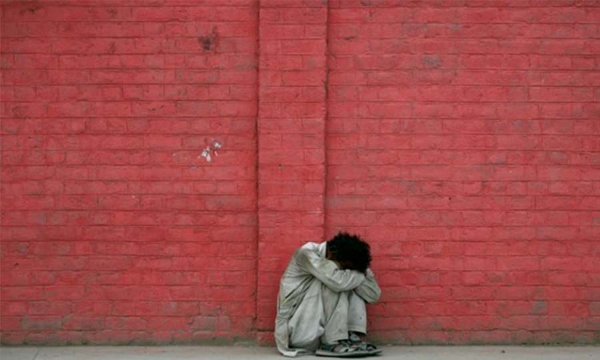1) An empirical study
The number of conflicts around the world is increasing and their complexity is growing. Over the last few years, more than 70 million people worldwide have been forcibly displaced by violence and conflict, the highest number of people affected since World War II. News are indeed full of the horrors of war and the physical destruction it leaves behind. However, despite these figures, the mental suffering of individuals, families and entire communities is hardly discussed. A serious omission. The war may be over, their trauma is not.
In conflict or post-conflict situations, many people suffer from mental health disorders. According to a World Health Organization empirical study published in June 2019, the increase in people affected by conflict coincides with a growing interest in mental health. The study examines 129 cases of “mental disorders” in conflict-affected populations and finds that nearly one-quarter of these populations experienced depression, anxiety, post-traumatic stress, bipolar condition, and schizophrenia.
Given the high prevalence of mental disorders among people affected by humanitarian emergencies, urgent mental health interventions are therefore necessary to address this burden. Mental healthcare is a human right and should be available to all. As remarked by Sigrid Kaag for the Guardian, “psychosocial support is not a luxury, but a necessity. […] If we truly want to help a country with reconstruction, we shouldn’t just rebuild the bombed bridges. We should also help people repair their broken souls”.
To know more, please read:
https://www.thelancet.com/journals/lancet/article/PIIS0140-6736(19)30934-1/fulltext
2) Afghanistan
“I still have flashbacks, all night I can’t sleep”. These are the words of Ahmad S., a survivor from a suicide bombing attack. Ahmad directly witnessed the explosion near the Supreme Court in Kabul, but was offered no psychological help after the event. “Nobody came to ask about my mind […] They only treated my body.”
Afghanistan has been at war since April 1978. The extraordinary level of violence has had a devastating impact on the mental health of tens of millions of Afghans. More than a half of the population, including many survivors of conflict-related violence, struggle with deep traumatic wounds, such as depression, anxiety, and post-traumatic stress, but fewer than 10% receive adequate psychosocial support from the state. This is because mental healthcare in such situations is, at best, only a secondary concern.
According to Human Rights Watch (HRW), “the Afghan Government is failing to provide sufficient psychosocial, or mental health, support to Afghans who have experienced traumatic events. […] The lack of services, as well as a distrust in public health care and corruption, lead people to pay about three-quarters of their health cost, despite government efforts to provide universal free health care. While adequate investment in mental health is important, the funds need to be spent appropriately, respecting human rights standards”.
In April 2019, HRW interviewed 21 Afghans – 14 men and 7 women – in Kabul, Kandahar, and Herat who had experienced psychological distress after direct exposure to conflict-related violence, such as suicide attacks, aerial bombardment, ground fighting, and casualties from unexploded munitions. More than half said they had received little or no psychological support from public health services. Nearly half said they did not know about existing mental health resources.
In this regard, it is important to recall that all parties to the conflict, including the Taliban insurgents, are responsible in the areas they control for the availability, accessibility, acceptability, and quality of health care, and to facilitate humanitarian aid. In particular, under international human rights law, the Afghan Government has a specific obligation to move toward the highest attainable standard of health, including mental health, to the maximum of its available resources and on the basis of informed consent.
To know more, please read:
https://www.hrw.org/news/2019/10/07/afghanistan-little-help-conflict-linked-trauma
3) Ukraine and Myanmar
Mental health studies show that refugees are surprisingly resilient. Most react to displacement and losses with acute stress and grief reactions. A smaller proportion – usually no more than one in five – present mild or moderate forms of mental health problems, including moderate PTSD. A lesser number suffer serious disorders, such as bipolar disorder or psychosis.
For people living on the frontline in eastern Ukraine, some help is at hand. Proliska, an organization which cooperates with UNHCR, is among aid groups redoubling their efforts to provide psychosocial assistance to people whose lives have been shattered by the conflict. Since October 2018, Proliska’s 11 psychologists have been reaching out to communities in government-controlled areas. While needs are huge, since the beginning of 2019 they have provided counselling to 1,100 people, of whom 72 per cent are women.
“The work of Proliska in Ukraine is encouraging, and the numbers of people assisted are impressive”, comments Peter Ventevogel, Senior mental health officer at UNHCR. But much more can be done. In Bangladesh, for example, Mahmuda, is the only psychologist that UNHCR has at the two official government-run refugee camps in Kutupalong and Nayapara. Mahmuda has extremely limited resources, not least, time. “All the refugees have gone through many traumatic experiences” Mahmuda says. “They have walked for three or four days, or they have come by boat … they have seen slaughter, shooting, torture, rape… they have seen everything.”
“Mental health and psychosocial support should be an integral part of the humanitarian response in crisis and emergency situations around the world”, says Peter Ventevogel. With this in mind, and with the aim to promote the rapid adoption of these services, UNHCR staff and refugees will be taking part in an international conference, hosted by the Dutch Minister for Foreign Trade and International Cooperation, on 7 and 8 October 2019.
To know more, please read:
https://www.unhcr.org/news/latest/2017/1/586b78de4/qa-far-traumatized-refugees-surprisingly-resilien







